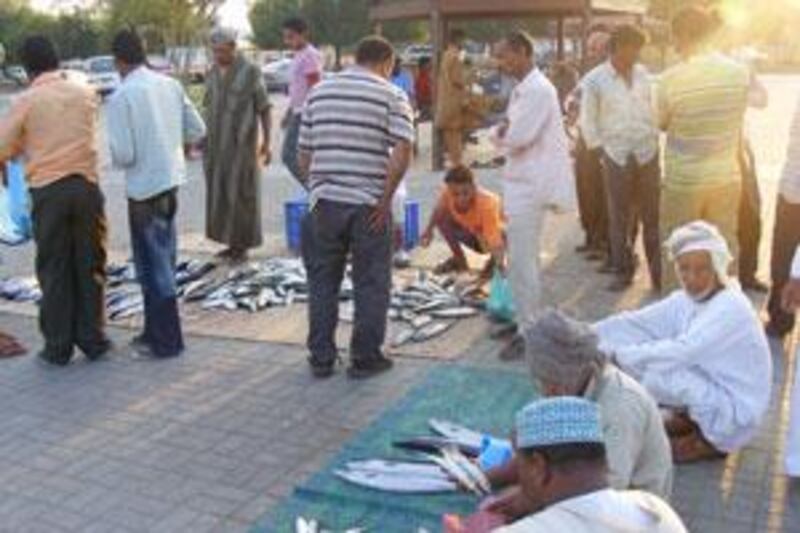MUSCAT // A seesaw economy has spurred an increase in the number of roadside vendors operating in major towns of Oman, some of them seeking a second income to meet rising costs. Ranging from fruit and vegetable sellers to cook-on-spot food vendors, they claim the pavements of Muscat, Salalah and Sohar in rent-free enterprise. "Inflation has been biting very hard in the pockets of some people in Oman in the past two years. Those who are in the low-income category find a way out to increase their income by being enterprising in the streets in their spare time," Mohammed al Rabeea, an employment consultant in Muscat, said.
According to Central Bank statistics, Oman's inflation touched 12 per cent in 2008 compared to eight per cent the previous year, pushing general consumer prices up. The inflation figure in 2009 is not out yet. Oman's Central Bank governor, Hamoud Sangour al Zadjali, told reporters this year the sultanate was "importing inflation" caused by the weakness of the US dollar. Oman's rial is pegged to the greenback and the country imports food and other goods in dollars.
Said Khusaiby, 34, is a baggage handler by day at Muscat airport and a barbecue vendor by evening at seafront pavements in Azaiba, a district of the Omani capital. "I get paid 520 rials (Dh5,100) a month, which includes overtime, for removing baggage from the conveyor belts. It was OK until the food prices and other goods went crazy. I have four children and there is no way I can support them with that pay. This business is a lifesaver for me," Mr Khusaiby said.
He grills mutton and chicken wings on wooden skewers over burning coals and serves on paper plates, while customers stand on the side waiting. Mr Khusaiby said his 7-11pm work fetches him an average monthly profit of 550 rials, more than doubling his income. Mr Khusaiby cooks on his two by half metre grill on the pavement serving 30 to 50 customers Wednesday to Sunday evenings, and reserves Mondays and Tuesdays for night shifts at the airport. But he says it would not have been possible without his wife's help.
"I am happy because it pays my bills though it takes my evenings away the entire week. My wife plays a big role in this business. She buys and prepares the meat while I take a rest between my day job and the evening one," Mr Khusaiby said. Street vending is a lifeline for some retired people, too. Juma Salim, 74, a former bank security guard, sells fresh fish, fruit and vegetables next to a car park in Sohar's Batnah region. Mr Salim's average monthly profit is twice his pension of 220 rials a month.
"It is by the grace of God that I make money to help me in my old age. My small pension is not enough, but the street business is making up the discrepancy," he said. Mr Salim does not do evening business; he says he is too old to work long hours, but he is at the car park daily 7am to 1pm, except on Fridays. He showed a toothless mouth when asked why he needed the extra cash. "I have acquired a second wife a year and half ago," he answered.
Both Mr Salim and Mr Khusaiby began earning extra money from the streets less than two years ago. This reflects the rise in pavement vending, according to municipality workers. "It is new - there were hardly any street vendors in Oman before 2007, except those occasional kids selling fruits by the roadsides during the school holidays," Ali Mohammed, a municipality health inspector for the governorate of Sohar, said.
Street selling is getting popular not only because it earns vendors much-needed cash but it has little overhead, said Mohammed Nasser, a 40-year-old school caretaker who sells livestock from a three-tonne lorry. "You don't pay rent," Mr Nasser said. "It is the government land where we set up our business. I can drive and park my lorry anywhere I like and wait for customers." Unlike shopkeepers, they also do not pay utility bills. Street vendors also have the luxury of moving to the next spot without any hassle if business is not brisk.
"This is my second spot," Mr Khusaiby said. "It did not take off so well in the first three months I started doing this street business, so I moved to this spot a year ago. It is so cheap and convenient to do it." Mr Mohammed said the government, according to the Health Act, prohibits street vending because of hygiene reasons. "We are asked by our bosses to turn a blind eye to street sellers. They understand that they need to make ends meet, at least for now. That may change in the future."
@Email:salshaibany@thenational.ae





